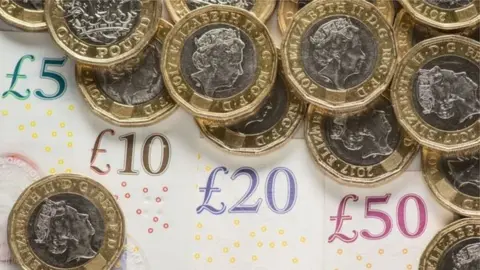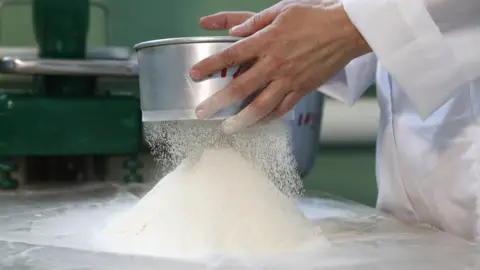Coronavirus: The government guarantee that may save businesses
 PA Media
PA MediaAmong the billions of pounds of support the government has given to help prop up businesses, one measure announced this week passed with little notice.
It's perhaps not surprising, as the words 'trade credit insurance' do not exactly quicken the the pulse.
But in terms of keeping goods flowing through the global economy, this financial product is essential.
"To small and medium-sized businesses, it's very significant," said Martin White, chairman of Bawnbua Foods, a Northern Ireland meat processor.
It allows suppliers of goods to insure against the risk that the companies they are selling to won't pay.
For example, a flour mill selling to a cake factory could give the factory 60 days to pay.
That gives the cake factory time to create its products and sell them, so generating the cash to pay the flour supplier.
The flour supplier is comfortable because it has trade credit insurance - it will pay out if the cake factory gets into financial trouble and can't settle its bill.
But without the insurance, that commercial relationship changes. The flour supplier now wants to be paid more quickly, perhaps even cash-on-delivery.
 Getty Images
Getty ImagesThat puts a cash squeeze on the cake factory, which reduces the amount of flour it can buy, cuts the number of cakes it can bake and could ultimately make the business unviable.
One of the many economic problems of the coronavirus crisis is that writing trade credit insurance looks increasingly risky, so levels of cover are being reduced or removed altogether.
Nigel Birney, who heads the trade credit division at insurance broker Willis Towers Watson in Belfast, said Brexit was already leading to a tightening of terms for some companies, but coronavirus had caused a sudden and severe impact.
He said to think of creditworthiness as being assessed on a rough scale of 1-10, with a global giant like Apple at 1 and a seriously distressed business at 10.
In normal times, underwriters would write business on companies at grades 1-8, but with the current economic shock they have become more conservative.
UK scheme details not clear yet
"They are turning the dial to remove cover on let's say grades 6, 7 and 8," he said.
"All of a sudden you have lost your cover."
The effects of this can ripple through supply chains, pressuring cash flows and taking otherwise viable businesses to the brink.
This has prompted the government to act with a pledge to temporarily guarantee transactions currently supported by trade credit insurance.
The guarantees will cover trading by both domestic firms and exporting firms. Agreements with insurers are intended to be in place by the end of this month.
Other governments in Europe have already acted and implemented guarantee schemes.
For example, Germany's scheme received state aid approval from the European Commission more than a month ago.
It involves the German government giving guarantees of €30bn (£26.7m) in return for insurers committing to maintain or even extend their coverage and to pay two-thirds of their premiums to the government this year.
The details and the scale of the UK scheme are not yet clear.
"The initiative is welcome but it's vague," said Martin White.
He is also concerned that just winding the clock back to the sort of cover on offer in January may not be enough.
"We were already starting from a very low base because of Brexit and at the end of the day that was due to government policy."

- EASY STEPS: How to keep safe
- A SIMPLE GUIDE: What are the symptoms?
- CONTAINMENT: What it means to self-isolate
- HEALTH MYTHS: The fake advice you should ignore
- MAPS AND CHARTS: Visual guide to the outbreak
- VIDEO: The 20-second hand wash
